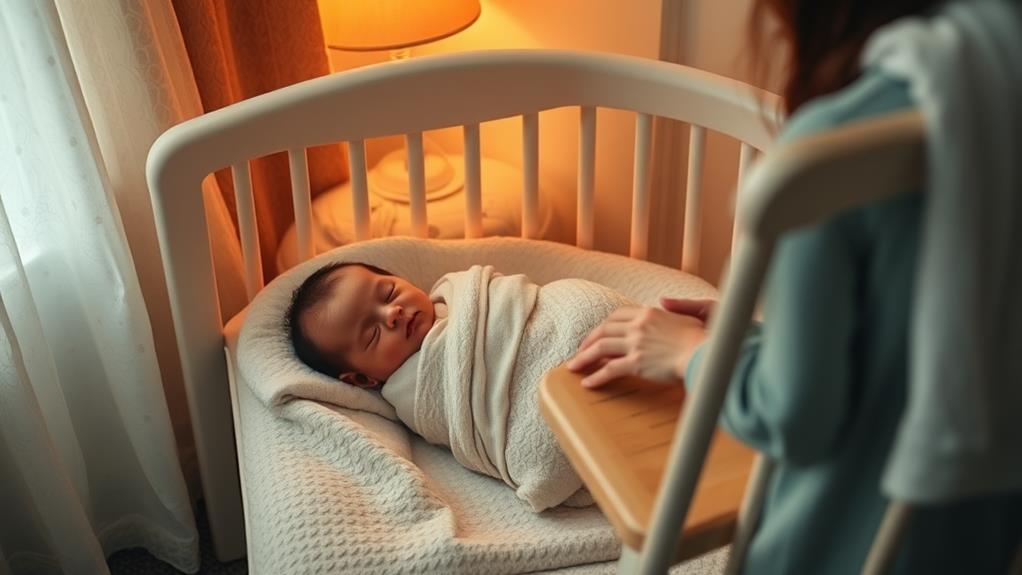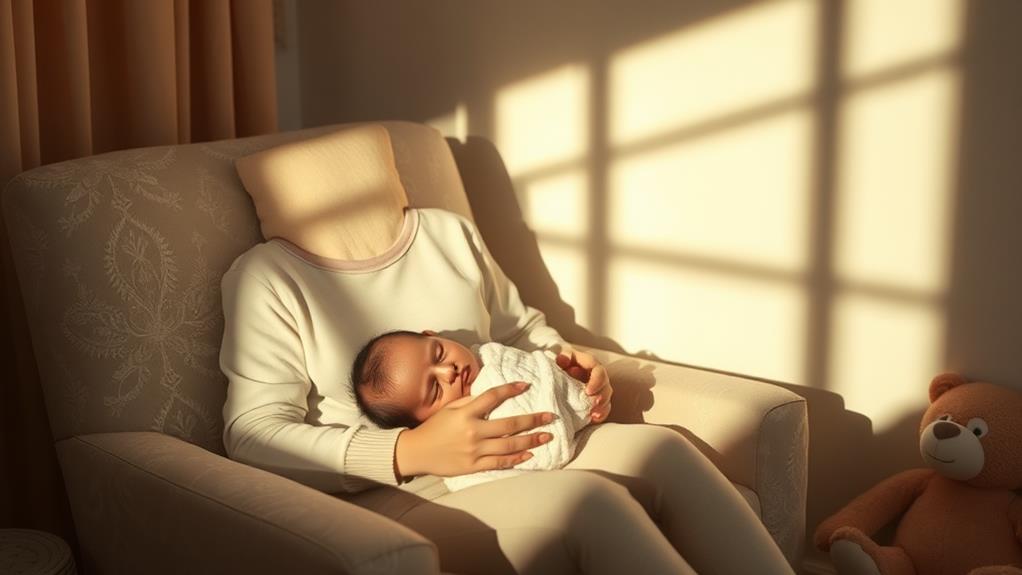You might find yourself wondering why your newborn won't sleep unless you're holding them, and it's a common struggle for many new parents. This behavior often stems from their innate need for security, similar to the comfort they felt in the womb. With underdeveloped nervous systems and short sleep cycles, every little disturbance can wake them. However, there are practical strategies you can implement to help your baby sleep more soundly. But before you try them, it's important to understand the underlying factors at play.
Understanding Newborn Sleep Patterns

In the early weeks of life, understanding newborn sleep patterns can feel like deciphering a complex code. Newborns sleep a lot—around 16 to 18 hours a day—but their sleep isn't continuous. Instead, it's broken into short cycles, usually lasting about 50 to 60 minutes. This means they'll spend more time in lighter sleep phases, making it easier for them to wake up frequently.
You might notice your little one dozing off for a bit, only to be wide awake just moments later. It's normal! Their circadian rhythms aren't developed yet, so they can't tell day from night. You'll find that they're often ready to play or eat, even during the wee hours.
Another key point is that newborns tend to feel more secure when they're close to you. That's why you might find them sleeping better when held. They seek comfort and warmth, which is why they often wake up when put down.
The Need for Security
Many newborns thrive on the sense of security that comes from being held close. When you hold your baby, they feel your warmth and hear your heartbeat, which creates a comforting environment. This closeness mimics the womb, where they spent months in a snug, secure space. Without that feeling of safety, it's no wonder they struggle to sleep.
You might notice that when you hold your newborn, they settle down more easily. This connection helps them feel safe and protected, reducing stress levels. It's as if they're saying, "I'm okay because you're here." Newborns have a natural instinct to seek out comfort, and being held offers them just that.
Of course, this need for security is completely normal. As a parent, you're providing your baby with a sense of trust and love.
To support your little one's sleep, consider swaddling them or using a baby carrier, so they can feel your presence even when you can't hold them directly. By understanding this need for security, you can help your newborn feel more at ease, leading to better sleep for both of you.
After all, a happy baby often means a happy parent!
The Role of Parental Presence

Parental presence plays a crucial role in helping newborns feel secure enough to sleep. When you're nearby, your baby can sense your warmth and comfort, which reduces anxiety and promotes relaxation.
Newborns are wired to seek closeness; they thrive on the familiar sounds of your heartbeat and voice. This connection helps them settle into sleep more easily.
You might notice that when you hold your baby or stay close, they often drift off more quickly. Your presence acts like a soft blanket, wrapping them in safety. Even if they're in a crib, just knowing you're nearby can make a significant difference.
Creating a soothing environment is also essential. Dim lights and gentle sounds can enhance the feeling of security.
Try sitting quietly beside them, talking softly, or even humming a lullaby. This can help your baby understand that it's time to relax and sleep.
Recognizing Hunger Cues
Understanding your baby's needs goes beyond just providing comfort; recognizing hunger cues is vital too. Newborns communicate their hunger in several ways, and learning to spot these signs can make a big difference in their comfort and your sanity.
Watch for signs like smacking lips, putting their hands to their mouths, or rooting—when they turn their head and open their mouth as if searching for a nipple. These cues often appear before your baby starts crying, which is a more intense signal of hunger. If you catch these early signs, you can feed your baby before they become fussy, making the experience smoother for both of you.
Some babies may also get fidgety or squirmy when they're hungry, so keep an eye on their body language. It's crucial to respond promptly, as a well-fed baby is more likely to relax and fall asleep peacefully.
Sleep Associations and Habits

From the moment they enter the world, newborns begin forming sleep associations that can significantly impact their sleep habits. These associations are links between certain conditions and the ability to fall asleep. For instance, if your baby only sleeps while being held, they might start to associate sleep with your comforting embrace. This can make it difficult for them to settle down on their own later.
As your little one grows, they'll likely develop preferences for specific environments, like a dark room or soothing sounds. These factors can become crucial for helping them drift off to sleep. If you often rock or nurse them to sleep, they may come to rely on those actions as a cue for bedtime.
Recognizing these patterns is essential. It can help you understand why your baby wakes up frequently and struggles to sleep independently.
Just remember, it's natural for newborns to form these associations, but being aware of them can guide you in fostering healthier sleep habits in the future.
Practical Solutions for Parents
Finding effective strategies to help your newborn sleep can feel overwhelming, but there are practical solutions that can make a difference.
First, consider creating a consistent bedtime routine. A calming sequence of activities, like a warm bath or gentle rocking, can signal to your baby that it's time to wind down.
Next, try swaddling your newborn. This snug wrapping mimics the womb, providing comfort and security. Just make sure to do it safely, leaving enough room for their legs to move.
You can also experiment with white noise machines or soft music, which can help drown out sudden noises that might wake them.
Additionally, holding your baby while they fall asleep can help, but you can gradually introduce them to sleeping in a crib or bassinet. Start by placing them down while they're drowsy but still awake. This helps them learn to self-soothe and fall asleep independently over time.
Lastly, don't hesitate to reach out for support. Whether it's asking family for help or connecting with other parents, you're not alone in this journey.
Implementing these strategies can lead to more restful nights for both you and your newborn.
Creating a Sleep-Friendly Environment

A cozy and calming sleep environment is crucial for helping your newborn drift off peacefully. Start by choosing a quiet room, away from loud noises and distractions. Soft lighting, like a dim lamp or nightlight, can create a soothing atmosphere, signaling to your baby that it's time to sleep.
Next, consider the temperature. A comfortable room, ideally between 68 and 72 degrees Fahrenheit, can keep your baby cozy without overheating. You can also use a white noise machine or a gentle fan to create a consistent background sound, which can help drown out any sudden noises that might wake your little one.
Make sure your baby's sleep area is safe and comfortable. A firm mattress with a fitted sheet in a crib or bassinet is essential. Avoid blankets or stuffed animals, as they can pose safety risks.
Dress your newborn in light, breathable fabrics to keep them comfortable throughout the night.
When to Seek Professional Help
Recognizing when to seek professional help for your newborn's sleep issues can be challenging. You might feel overwhelmed or unsure if your baby's sleep patterns are normal. If your newborn consistently struggles to sleep for more than a few hours at a time, it's time to consider reaching out to a pediatrician.
It's especially important if you notice signs of distress, such as excessive crying or difficulty calming down, as these could indicate underlying issues.
Other red flags include a lack of weight gain, feeding problems, or unusual lethargy. If your little one seems unusually irritable or resistant to sleep, don't hesitate to consult a professional.
They can provide guidance tailored to your situation, helping you understand whether it's typical newborn behavior or something more concerning.




